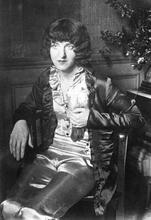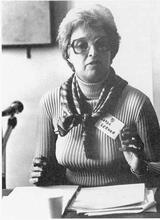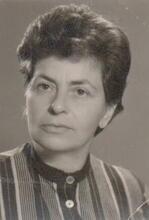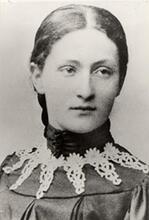Margo Glantz
Margo Glantz fused Yiddish literature, Mexican culture, and French tradition to create experimental new works of literature. Glanz graduated from the National Autonomous University of Mexico (UNAM) in 1953 and earned a doctorate in Hispanic literature from the Sorbonne in Paris before returning to Mexico to teach literature and theater history at UNAM. A prolific essayist, she is best known for her 1987 autobiography Las genealogías, which blended her experiences of growing up Jewish in Catholic Mexico with her parents’ immigrant experiences. She also wrote fiction and nonfiction that shed new light on the seventeenth-century nun Sor Juana Inés de la Cruz. Among her many honors, she won the Magda Donato Prize for Las genealogías and received a Rockefeller Grant (1996) and a Guggenheim Fellowship (1998).
The diverse literary works of Margo Glantz are a testament to her personal and professional diversity. Recognized primarily for her critical studies of Sor Juana Inés de la Cruz (1648 or 1651–1695), an exemplary woman living in Colonial Mexico who remained a closeted intellectual and writer behind the guise of a nun’s habit, Glantz displays equal expertise and wisdom in dealing with Jewish and indigenous cultural and historical experiences.
Family and Personal Life
Glantz was born in 1930 in Mexico City to Jewish immigrant parents, Jacobo Glantz (1899–1982) and Elizabeth Shapiro Glantz (1902–1997), who had recently immigrated to Mexico from the Soviet Union. She has three sisters: Lilly (b. 1927), Susana (b. 1935) and Shulamith (b. 1940). She became heir to the rich Jewish culture and traditions of her family and to a vibrant literary tradition passed on to her by her father, an acclaimed poet who published in both the Spanish and Yiddish presses of Mexico.
Margo Glantz married twice, first to Francisco Lopez Camara and later to Luis Mario Schneider. Both husbands died. She has two daughters: Alina Lopez Camara (b. 1959) and Renata Schneider (b. 1971).
Literary Works and Identity
Glantz demonstrates tremendous versatility as an individual and as a writer in the creative ways in which she blends her multiple cultural, religious and literary affinities. She unabashedly resists classification or categorization of any kind and therefore identifies herself neither as a Jewish writer nor as a composer of personal narrative, nor as a Sor Juanista, the term used to refer to those scholars who devote themselves to the study of Sor Juana Inés de la Cruz. Belonging to no single one of these groups or schools of thought, she is an enigmatic amalgam of all of them. Glantz’s multiplicity is what makes her unique, and failure to recognize any component of her being would diminish her diversity.
Although Glantz would resist being labeled a Jewish writer, her autobiography, Las genealogías (The Family Tree 1987), confirms the significant role Judaism has played in her life and the undeniable impact it has made on her personal identity and writing. Glantz can be seen as a visionary in the creation of a literary space where memories and imagination transform and reaffirm the multifaceted self. Las genealogías is an overt convergence of historical facts and personal testimony. Glantz recounts her childhood stories and her parents’ memories from an analytical and reflective standpoint, serving as narrator, commentator, and active agent in her own life story and her family’s history.
While Glantz’s personal testimony certainly follows the traditional framework of the autobiographical genre, her exploration of the convergence of cultural, religious, and national elements places the work outside any established form of writing. She delves into the minds of her parents to uncover their memories of life in Russia and their perceptions of being Jewish in Mexico. Her approach to recording their personal testimonies is much like documenting an oral history that envelops the recorder and transports both interviewee and interviewer to a new realm of self-revelation.
Not only does Glantz weave her parents’ fragmented memories into her own recollections of growing up Jewish in Mexico; she constructs a text that incorporates collective memory and history for Jews in Mexico and throughout Latin America. In Las Genealogias, Glantz’s most renowned work, Jews who emigrated to Latin America and their children who were born there are able to see themselves and their attempts to assimilate and integrate into mainstream society. Glantz speaks as a Jewish transplant who is exploring and recording her physical and psychological journey in the form of literary expression.
Recognition and Awards
Margo Glantz is an exceptional literary critic, autobiographer, and scholar who is far too multifaceted to be classified solely as a Jewish writer. While she is a noteworthy Jewish writer of international repute, she also strongly identifies with Mexican, Catholic, and indigenous practices and beliefs. Her literary criticism, novels, short stories, newspaper articles, and university teaching attest to her personal and professional diversity. Glantz’s receipt of numerous literary and scholarly awards is further confirmation of her national and international repute. Among the distinguished accolades she has received are: Premio Magda Donato (1982) for Las genealogías; Premio Xavier Villarrutia (1984) for Síndrome de naufragios; Premio Universidad Nacional (1991) for teaching excellence at UNAM (National Autonomous University of Mexico); and Rockefeller (1996) and Guggenheim (1998) grants. Glantz is undoubtedly an exceptionally unique and versatile writer who has carved out a prominent place in the formally male-dominated Mexican literary canon.
From 2008 to 2010, the FCE published four volumed of Glantz’s collected works. She has since translated George Bataille, Tennesse Williams, and Michel de Ghelderode. She has been awarded honorary doctorates from the Universidad Autónoma Metropolitana (2005), the Universidad Autónoma de Nuevo León (2010), and the Universidad Nacional Autónoma de México (2011). Glantz was awarded with the 2004 National Prize for Sciences and the prestigious FIL Prize in 2010. She received Chile’s Manuel Rojas Ibero-American Narrative Award in 2015.
SELECTED WORKS BY MARGO GLANTZ
Las genealogías. México, D.F.: 1987.
An untraditional autobiographical work in which Glantz recounts her childhood memories of growing up Jewish in Mexico. She highlights the religious incompatibilities of the Jewish and Catholic beliefs and practices and the culture clashes between Mexican and Old World traditions.
Zona de derrumbe (On the Edge) Rosario: 2001.
A collection of four short stories in which Glantz engages in an intimate study of the female body. Glantz addresses the difficulty in expressing one’s genuine and unadulterated feelings in a language that does not always permit such candor.
No pronunciarás (Do not Use the Lord’s Name in Vain) México, D.F.: 1980.
An analysis of nomenclature and consequent survival of the Jewish culture and people as a result of the preservation and use of certain words that perpetuate and validate the Jewish people.
Obras reunidas. México, D.F.: Fondo de Cultura Económica, 2006-2013.
Saña. Lima: 2006.
Historia de una mujer que caminó por la vida con zapatos de diseñador. Barcelona: 2005.
Animal de dos semblantes. Santiago de Chile: 2004.
El rastro (The Wake). Barcelona: 2002.
Esquince de cintura (Hips A-Sway). México, D.F.: 1994.
La lengua en la mano (Language at Hand). México, D.F.: 1983.
De la amorosa inclinación a enredarse en cabellos (The Amorous Tendency to Get Tied Up In Knots). México,D.F.: 1984.
Síndrome de naufragios (Shipwreck). México, D.F.: 1984.
El día de tu boda (Your Wedding Day). México, D.F.: 1982.
Doscientas ballenas azules: y cuatro caballos (Two Hundred Blue Whales and Four Horses). México, D.F.: 1981.
Intervención y pretexto (Intervention and Pretext). México, D.F.: 1980.
Las mil y una calorías: novela dietética (1001 Calories: A Diet Novel). México, D.F.: 1978.
Alemany Bay, Carmen. Las ficciones heterodoxas de Margo Glantz: visions críticas. Madrid: Visor Libros, 2018.
Balutet, Nicholas. Poética de la hibridez en la literatura Mexicana posmodernista (Laura Esquivel, Margo Glantz, Luis Zapata). Madrid: Editorial Pliegos, 2014.
Enrigue, Álvaro. “Margo Glantz by Álvaro Enrigue.” Bomb Magazine, January 1, 2007.
Lobo, Fernanda Neves. “Entrevista a Margo Glantz: una literatura irreverente.” Caracol 21 (2021): 950-966.












